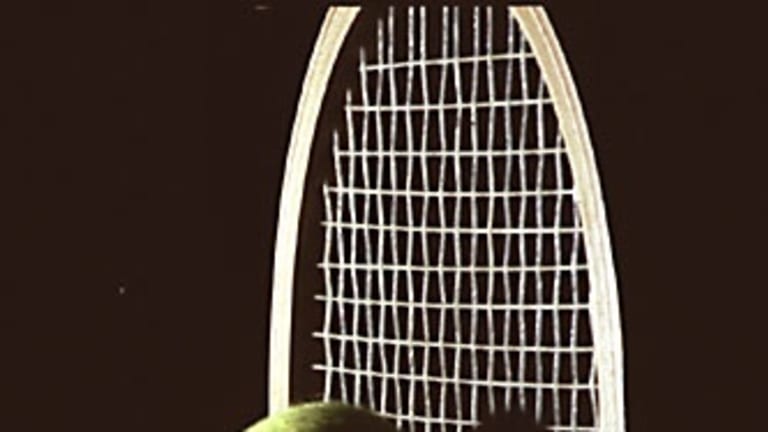I’m out next week, and will return August 20, in time for the run-up to the U.S. Open. Can it really be that time of year again already?
By then, we should have a new look around here at Tennis.com. Change, we think for the better, is coming soon on the site. Here's a personal post for the road.
**
The word “tennis,” on one level, means the same thing to all of us. Racquets, balls, lines, forehands, backhands, singles, doubles: That’s tennis. But anyone who plays it with more than one opponent knows that the sport changes, sometimes subtly, sometimes significantly, along with the face on the other side of the net. The rules, the equipment, the court size stay the same, but the experience of the game is a dynamic one. Whether it’s the particular spin your opponent puts on the ball, or what he or she likes to talk about on the changeovers, you'll find a different side of the sport with every friend and rival. "My tennis partner" is the term we use to describe them, and that's what we all are, partners in creating the sport together.
The subject is on my mind at the moment because one of my regular opponents—much more friend than rival—is moving out of New York. Jimmy is his name, and he’s leaving Brooklyn to teach creative writing at Wellesley College near Boston. There are worse-sounding gigs in the world, and this one has been well-earned. After years of taking teaching gigs part-time and writing on the side, his novel, The Arriviste, was published in 2011 and was up for the Best First Fiction prize from the Los Angeles Times this spring. Besides a love of tennis, we share a love of books. I doubt I’ll find another partner who will have Suetonious in his racquet bag and talk about Sebald and Bolaño between games.
When he told me about the award ceremony in L.A., Jimmy said he probably shouldn’t bother going because he wasn’t going to win. The comment was completely in character for the Jimmy I knew of him from the tennis court. Part absent-minded academic, part Woody Allen-esque master of self-deprecation, he was the least competitive of competitors. You might even say that he didn’t really like to win, because it violated his image of himself.
I remember Jimmy walking to the net after our warm-up, head down, shoulders hunched, pushing his glasses up and grumbling under his breath about his bad backhand and ragged grip.
I spun my racquet. “Up,” he said as it twirled.
“It’s down.”
“Right,” Jimmy said as he turned around to head back to the baseline. “Good!” He seemed to believe that he didn’t deserve to win the toss, that fortune was punishing him, rightly, for that bad backhand and beat-up grip of his.
Contrary to his opinion, however, Jimmy was and is a good player. He played in college and hits with such extreme topspin on both sides that I had to take many of his shots from above my head—my shoulder would be sore the day after our matches. But he was less-than-impressed with himself. If one of his topspin shots got past me me, he would say, “My specialty, the shank winner,” or “Don’t worry, I won’t hit it that way again.” When he went up a break in a set, he would stop on the changeover and say, “You’re always in it with me.” Sometimes I was, but sometimes he kept going and won the set anyway.
He was a character. On more than one occasion, Jimmy asked me where the third ball was on the court, only to discover, after a few seconds of searching, that it was in his own pocket. For some years, he had an old dog he would bring to the courts, without a leash, who would curl up under one of the sideline chairs while we played. When we finished, the dog, without a word from his master, would hoist himself up and walk in between us to the car. Jimmy was jokingly nicknamed “Wheels” by one of the other members, in part because he's fast, but also because he seemed like the least likely person to have a jocky nickname.
A bad shot could inspire him to have an animated talk with himself:
“What are you doing, you bozo!” he would yell, and then follow up with a lacerating response: “Shut up, just shut up.”
Even his well-reviewed book was nothing to brag about. When another club member asked him what it was about, Jimmy tried briefly to describe it (“It’s about this guy, I don't know, he’s kind of going downhill...”) before finally assuring him, “You probably wouldn’t want to read it anyway.”
The best thing about playing with Jimmy, besides the matches and the laughs, was the way he made the idea of serious competition seem faintly ridiculous, and far too solemn an activity. With Jimmy, unlike with other opponents of mine, playing poorly was fun, too. Screwing up could seem to be what tennis was all about.
Since he left, I’ve begun to play with a new, younger member named Jason. He works in the district attorney’s office, and is a very good athlete. He's competitive, but not overly so. We played two solid, sweaty sets last week. At the end, we walked to the net, told each other something like, “That was great, man,” and shook hands in the up grip, which, at the rec level, indicates a match well played. I'm looking forward to many more with Jason like that one.
Tennis will move on for me, to new opponents and friends, and the new relationships and dynamics and versions of the sport that they help create. It will be fun, and it won't be quite the same.
